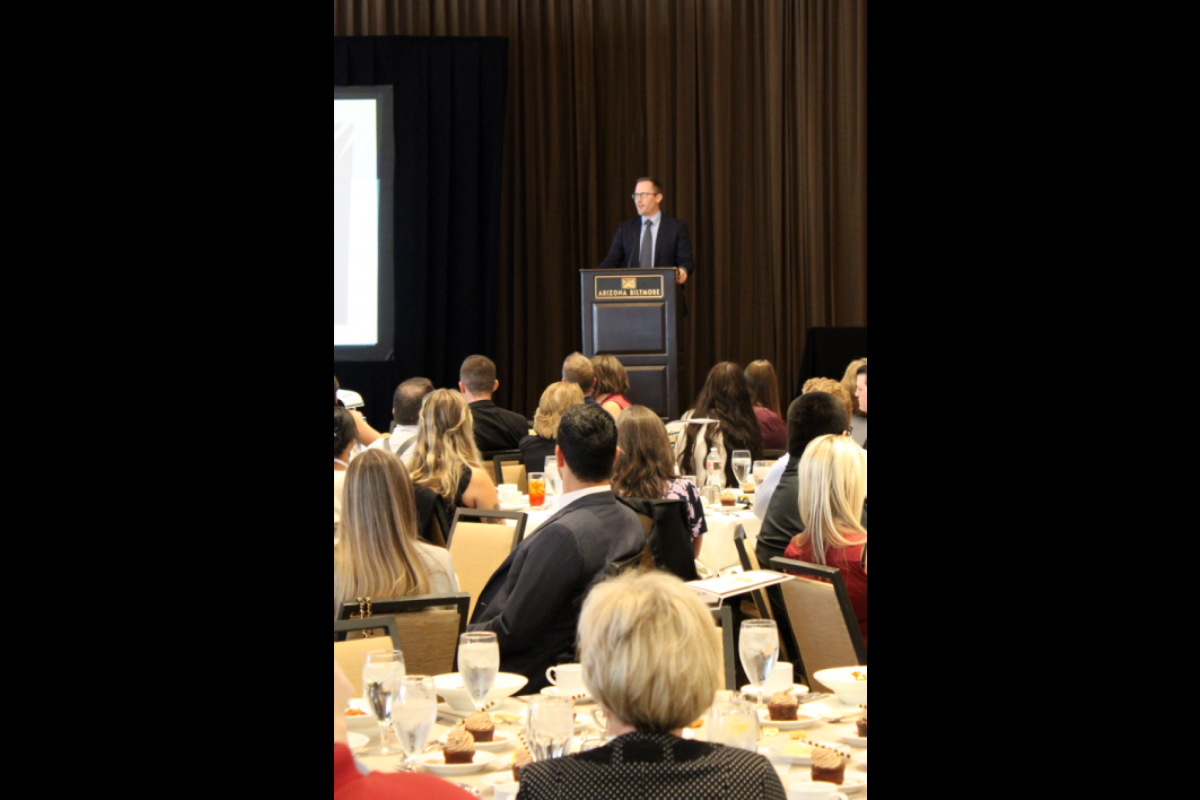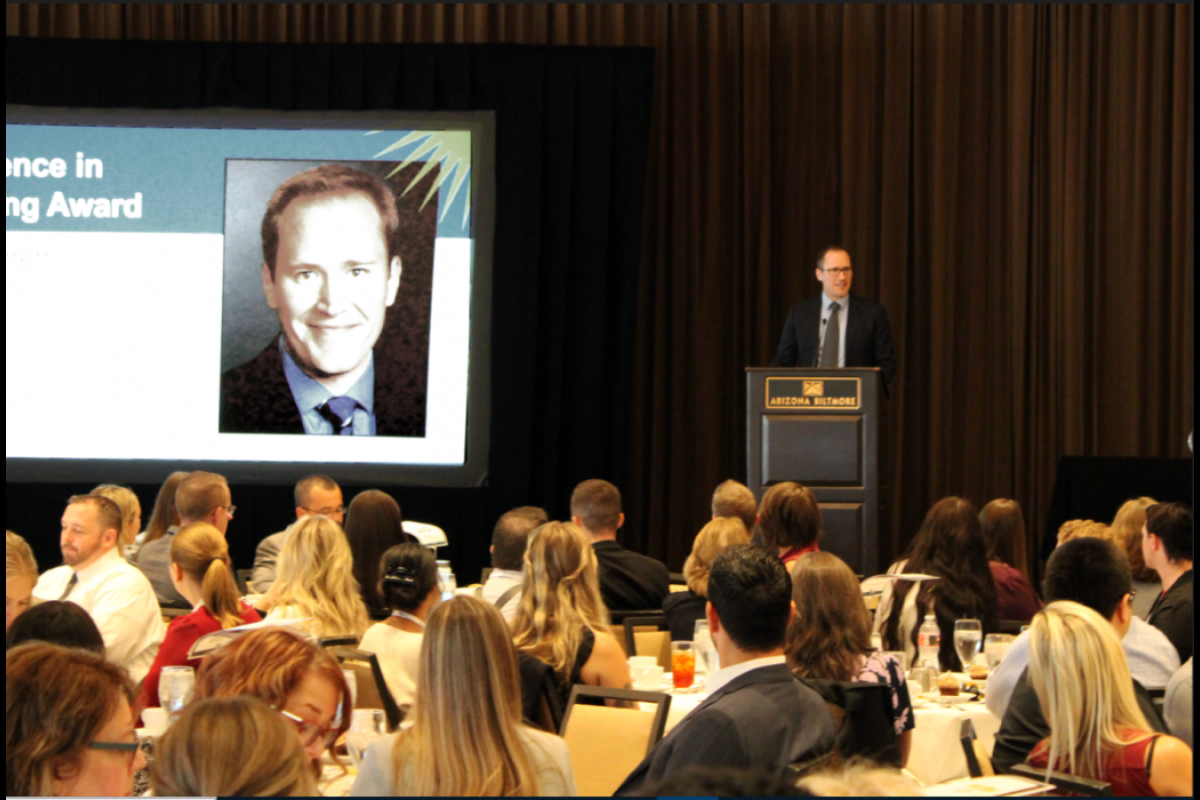ASU professor changes perspectives on accounting

ASU Associate Professor Scott Emett was honored with the Excellence in Teaching Award by the Arizona Society of Certified Public Accountants (ASCPA) for updating the W. P. Carey School of Business' introductory accounting curriculum.
As a first-year college student, Scott Emett was sure of one thing: There was no way he wanted to pursue a career in accounting. Then he took his major’s first required introductory accounting course.
The professor’s wit, charisma and passion for the subject completely changed Emett’s misconceptions of the field. Now an associate professor at the School of Accountancy in the W. P. Carey School of Business, Emett is gaining recognition for teaching the next generation the power of accounting.
On May 18, Emett was honored with the Excellence in Teaching Award at the Arizona Society of Certified Public Accountants (ASCPA) Annual Meeting and Awards Luncheon for updating the school’s introductory accounting curriculum. As an advocate for accountancy professionals and education across the state, the ASCPA recognizes one educator annually for their innovation and dedication to teaching accounting.
“I’m humbled and glad to receive this award. I see it as a recognition of the collective effort we’ve been making as a department to help students see the value of accounting,” Emett said.
Through technology, relevant examples and highlighting nontraditional career paths, Emett educates students on leveraging their accounting knowledge regardless of their future profession.
“I knew I wanted to change students’ perspectives about what accounting is and what it accomplishes,” he said. “Accounting is all about giving you a concrete skill set that you can use to produce useful information about companies. The more you acquire that skill set, the more you can produce useful information and ultimately make better decisions.”
Using real-world examples
In 2020, Emett received the Innovation in Accounting Education Award from the American Accounting Association (AAA). As the largest community of accounting professionals in academia, the association presents the award annually to an individual, group or institution for improving accounting education.
As businesses struggle to fill accounting positions and qualified candidates opt for roles in banking and tech, innovation in accounting education is crucial in fixing the talent pipeline.
“I think one of the reasons we’re seeing this pipeline issue is students have a lot of misconceptions about what accountants do,” Emett said. “One thing I’ve been trying to do in class is help students see what you can do with an accounting degree.”
Emett teaches ACC 231: Uses of Accounting Information, a 300-student required introductory accounting course for W. P. Carey business undergraduate students. He says experiential learning and instructor engagement are crucial to keeping his audience interested in the subject matter.
“I recognize that, in some ways, I have a very skeptical audience,” Emett said. “The most satisfying thing for me is seeing the students’ faces engaged and focused. It makes me feel good about how I’m approaching the course.”
Emett begins each class with a case study highlighting how the concept affects real-life business issues. By incorporating new technologies into his lessons, he emphasizes that pairing accounting with technology can help produce more useful insights. This past semester, Emett focused primarily on the banking crisis as a timely example of how accounting issues impacted Silicon Valley Bank and how its leaders could have anticipated the crisis.
Through recorded interviews with alumni, Emett also exposes students to nontraditional career paths. He recently spoke to two alums using their accounting degrees in unique ways: one as an FBI forensic accountant and one as the chief financial officer of the Arizona Diamondbacks. Examples of alums using accounting in fruitful, rewarding career paths help students visualize applying their accounting skills across many professions.
“A lot of our students don’t see these other opportunities that are available to them, and we’re trying to get the message out,” Emett said. “Accounting isn’t just debits, credits and spreadsheets.”
While Emett hopes to help solve the talent pipeline issue by exposing students who might succeed as accounting majors to the possibilities in the field, he ultimately wants to equip all of his students, regardless of their major, with tools to better understand how to leverage accounting in their lives.
“I want students to walk away from my class with a solid foundation in accounting and an appreciation of how that foundation can benefit their careers,” he said, “regardless of the specific career path they choose.”
More University news

3 ASU students earn Goldwater Scholarships for STEM research excellence
Three Arizona State University students have been named Goldwater Scholars for 2025, placing them among the nation’s most…

Provost Teaching Awardees, Charter Professors empower local communities, students
The ASU Charter embodies the university’s commitment to student success and research of public value and responsibility to…

New online Bachelor of Social Work program exceeding enrollment expectations
Social workers are in big demand.Citing U.S. Bureau of Labor Statistics figures, the National Association of Social Workers…



